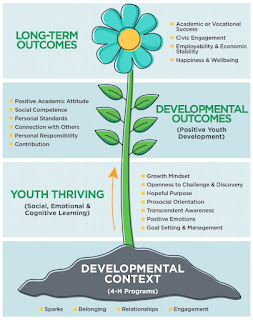For much of the past two years young people, just like us youth development professionals, have focused so much energy on being resilient and building coping and adapting skills in the face of challenges. We’ve all gotten the chance to get pretty good at it. As we plan our fall programming, how can we shift from a reactive to a proactive approach where we move beyond resilience toward thriving?
The 4-H Thriving Model illustrates how participating in high quality youth program settings helps youth thrive, and thriving youth achieve key developmental outcomes. Mary Arnold has led this work, and her blog about putting the 4-H Thriving Model into real world practice highlights the distinction between resilience and thriving:
But thriving, ah, thriving is different than resilience. Thriving is more than coping with adversity and overcoming incredible challenges despite how difficult the situation is. Thriving is about optimal development- about being the best we can be in our whole selves. In our minds, bodies, and spirit. Thriving means having the skills and support to do well regardless of the situation we find ourselves in. But a key point about thriving that is worth underscoring is that thriving is not a state – as in I was thriving yesterday, but today not so much. No, thriving is a process of development that takes place over time as we gain the social, emotional, cognitive and spiritual qualities that help us optimize who we are as human beings.
Youth certainly need resilience, but to fully support the developmental process of thriving they need much more. As I think about the young people I work with, we often talk with them about their pathway or journey. Their journeys of late include coping with stress, bouncing back from hardships, managing emotions, trying new challenges while persevering towards their goals, and having a hopeful future and purpose in life.
What experiences can we build for youth to thrive with their whole self as part of this process approach to development? What role do youth have in co-building that space? How are you seeing young people and your programs move from a sense of resilience into thriving?
-- Karen Beranek, Extension educator
You are welcome to comment on this blog post. We encourage civil discourse, including spirited disagreement. We will delete comments that contain profanity, pornography or hate speech--any remarks that attack or demean people because of their sex, race, ethnic group, etc.--as well as spam.

Comments
Post a Comment